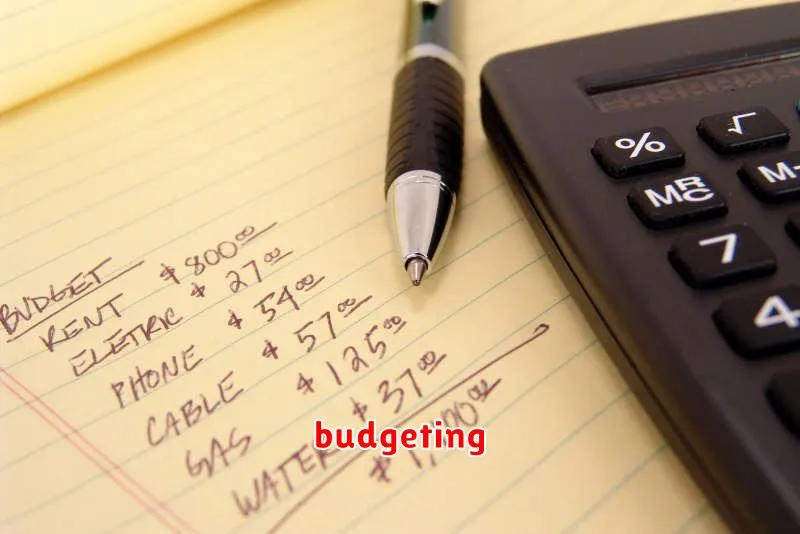Are you tired of living paycheck to paycheck? Do you feel like you’re constantly struggling to make ends meet? If so, you’re not alone. Many people find it difficult to manage their finances effectively. But don’t worry, there’s a solution! By implementing smart money management strategies, you can create a budget that works for you and finally achieve financial freedom.
Creating a budget is the first step towards financial stability. It allows you to track your income and expenses, identify areas where you can cut back, and plan for your financial future. With a well-designed budget, you can eliminate unnecessary spending, save for your goals, and gain control of your finances. This article will guide you through the process of creating a budget that aligns with your needs and helps you achieve your financial aspirations.
Why Budgeting is Essential for Financial Success
A budget is a financial plan that outlines how you will manage your income and expenses. It’s a critical tool for achieving financial success because it helps you take control of your finances, make informed decisions, and reach your financial goals.
Creating a budget allows you to track your income and expenses, providing a clear picture of your financial situation. This insight enables you to identify areas where you can save money, reduce unnecessary spending, and prioritize your financial goals. By allocating your income strategically, you can ensure that you’re meeting your essential needs, paying off debt, and saving for the future.
Budgeting also fosters a sense of financial discipline. It encourages you to make conscious choices about your spending and avoid impulsive purchases. By sticking to your budget, you develop a healthy relationship with money, preventing overspending and financial stress.
In conclusion, budgeting is essential for financial success. It empowers you to take control of your finances, make informed decisions, and achieve your financial goals. By creating and adhering to a budget, you lay the foundation for a secure and prosperous financial future.
How to Create a Monthly Budget
Creating a budget is a crucial step towards achieving financial stability and reaching your financial goals. It involves tracking your income and expenses, allowing you to understand where your money goes and make informed decisions about spending.
Here’s a step-by-step guide to creating a monthly budget:
1. Track Your Income
Start by listing all your sources of income, including your salary, wages, investments, and any other regular income streams. Be sure to factor in any deductions or taxes that are taken out of your income.
2. Track Your Expenses
Keep a record of all your expenses for a month. This includes fixed expenses like rent, utilities, and loan payments, as well as variable expenses like groceries, entertainment, and dining out. You can use a spreadsheet, budgeting app, or a simple notebook to track your expenses.
3. Categorize Your Expenses
Once you have a list of your expenses, categorize them into different groups such as housing, transportation, food, entertainment, and personal care. This will give you a clear picture of where your money is going and help you identify areas where you can potentially cut back.
4. Create a Budget Plan
Based on your income and expenses, create a budget plan that outlines how you will allocate your money each month. This plan should include your essential expenses, savings goals, and any debt repayment plans.
5. Allocate Funds to Savings and Debt
It’s important to allocate a portion of your income to savings and debt repayment. Set aside a specific amount each month for your emergency fund, retirement savings, and any outstanding debts.
6. Monitor and Adjust Your Budget
Once you have established your budget, monitor your spending regularly and make adjustments as needed. Your financial situation may change over time, so it’s important to stay on top of your budget and make sure it’s still working for you.
7. Use Budgeting Tools
There are various budgeting tools available, including spreadsheets, budgeting apps, and financial software. Experiment with different tools to find one that suits your needs and helps you stay on track with your budget.
Creating a budget may seem daunting at first, but it’s an essential step towards financial security. By tracking your income and expenses, allocating funds strategically, and making regular adjustments, you can take control of your finances and achieve your financial goals.
Tips for Sticking to Your Budget
Sticking to a budget can be challenging, but with some strategic planning and consistent effort, you can achieve your financial goals. Here are some tips to help you stay on track:
Track your spending: The first step to managing your money effectively is to understand where your money is going. Use a budgeting app, spreadsheet, or notebook to record all your expenses for a month. This will give you valuable insights into your spending habits.
Set realistic goals: Don’t try to overhaul your spending habits overnight. Start with small, achievable goals. For example, aim to reduce your dining out expenses by 10% or save $50 per week. As you gain momentum, you can set more ambitious goals.
Automate your savings: Set up automatic transfers from your checking account to your savings account. This ensures that you save regularly without having to think about it. You can also automate bill payments to avoid late fees and keep your finances organized.
Find ways to save: Look for opportunities to cut down on unnecessary expenses. This could include bringing your lunch to work, finding cheaper alternatives to entertainment, or negotiating better deals on your bills.
Reward yourself: Sticking to a budget can be tough, so make sure to reward yourself for your progress. Treat yourself to something you enjoy, but be sure to stay within your budget.
Stay consistent: Budgeting requires ongoing effort. Don’t let your budget slip. Review your expenses regularly and adjust your budget as needed. Consistency is key to achieving your financial goals.
How to Track Your Spending Habits
Tracking your spending habits is a crucial step in creating a budget that works for you. It allows you to see where your money is going and identify areas where you can cut back. Here are some effective ways to track your spending:
1. Use a Budgeting App: Numerous budgeting apps are available, such as Mint, Personal Capital, and YNAB. These apps connect to your bank accounts and automatically track your transactions. They provide insightful reports and help you set financial goals.
2. Maintain a Spending Journal: A simple notebook or spreadsheet can work wonders. Record every expense, including the date, category, and amount. This method provides a hands-on approach to understanding your spending patterns.
3. Review Bank Statements Regularly: Regularly examine your bank statements for recurring charges or unexpected expenses. This helps you identify potential areas of overspending and allows you to make adjustments.
4. Categorize Your Expenses: Classify your spending into categories like housing, food, transportation, entertainment, and savings. This categorization helps you understand where most of your money is going and identify areas for optimization.
5. Set Realistic Goals: Establish attainable financial goals and track your progress towards them. This will motivate you to stay on track and make informed spending decisions.
By implementing these methods, you gain valuable insights into your spending habits. This information empowers you to create a budget that aligns with your financial goals and leads to greater financial control.
Using Apps and Tools for Budgeting
Budgeting can feel overwhelming, but luckily, there are numerous apps and tools available to make the process easier and more efficient. These digital aids offer various features to help you track your spending, set financial goals, and manage your money effectively.
One of the primary advantages of using budgeting apps is their ability to automatically track your transactions. By connecting your bank accounts to the app, you can see all your spending in real-time, allowing you to understand where your money is going. Many apps also categorize your expenses, making it easy to identify areas where you might be overspending.
Another helpful feature of these tools is goal setting. Apps allow you to create specific financial goals, such as saving for a down payment on a house or paying off debt. By setting goals, you can stay motivated and track your progress towards achieving them. Some apps even provide personalized recommendations based on your financial situation and goals.
Here are some popular budgeting apps and tools to consider:
- Mint: A comprehensive budgeting app that tracks spending, sets budgets, and provides financial insights.
- YNAB (You Need a Budget): Focuses on zero-based budgeting, where you allocate every dollar of your income.
- Personal Capital: Offers financial planning and investment management alongside budgeting features.
- EveryDollar: A budgeting tool based on Dave Ramsey’s financial principles.
- PocketGuard: Helps you track spending, set budgets, and avoid overspending.
Whether you’re a seasoned budgeter or just starting, using apps and tools can greatly simplify the process. They provide valuable insights, help you stay organized, and empower you to take control of your finances.
The Importance of Financial Discipline
Financial discipline is the cornerstone of smart money management. It’s the ability to control your spending, prioritize your financial goals, and make responsible choices with your money. It’s not about being restrictive; it’s about making conscious decisions that align with your values and aspirations.
Financial discipline brings numerous benefits. It allows you to:
- Save for the future: Whether it’s a down payment on a house, a comfortable retirement, or simply a rainy-day fund, financial discipline gives you the power to reach your savings goals.
- Reduce debt: By prioritizing debt repayment and making consistent payments, you can break free from the cycle of debt and achieve financial freedom.
- Avoid impulsive spending: Financial discipline helps you resist the urge to splurge on unnecessary items, allowing you to allocate your money towards things that truly matter.
- Achieve financial stability: Consistent financial discipline creates a solid foundation for your financial well-being, providing a sense of security and control over your finances.
Developing financial discipline is a journey, not a destination. It requires conscious effort and commitment. It’s about creating habits that foster a healthy relationship with your money.
How to Set Realistic Financial Goals
Setting realistic financial goals is crucial for achieving long-term financial success. When your goals are attainable, they are more likely to be achieved, and the journey to achieve them is more enjoyable and less discouraging. Here are some tips to help you set realistic financial goals:
Start with your “why.” Before you set any financial goals, it’s important to understand your motivations. What are you hoping to achieve with your money? Are you saving for a down payment on a house? Paying off debt? Investing for retirement? Once you know your “why,” you can start setting goals that are aligned with your values and aspirations.
Be specific and measurable. Don’t just say, “I want to save more money.” Instead, set a specific and measurable goal, such as “I want to save $5,000 in the next year.” When you have a concrete goal, you can track your progress and stay motivated.
Set a timeline. Having a deadline can help you stay on track. For example, if you want to save $5,000 in the next year, you need to save about $416 per month. This will help you break down your goal into smaller, more manageable steps.
Consider your current financial situation. Be honest with yourself about your income and expenses. Setting a goal that’s out of reach can be discouraging. Start with smaller goals and work your way up.
Don’t be afraid to adjust your goals. Your financial situation can change over time, so it’s important to adjust your goals as needed. For example, if you experience a job loss or an unexpected expense, you may need to lower your savings goal.
Setting realistic financial goals is a key step towards financial success. By following these tips, you can create goals that are attainable, motivating, and aligned with your individual financial aspirations.
The Benefits of Zero-Based Budgeting
Zero-based budgeting is a method of budgeting that starts from scratch each budgeting period. Instead of simply carrying over last month’s budget, you’ll begin by allocating every dollar of your income to specific expenses. This forces you to prioritize your spending and ensure that every dollar is being used effectively.
Here are some of the key benefits of zero-based budgeting:
- Increased Financial Awareness: By meticulously allocating every dollar, you gain a deeper understanding of your spending habits and where your money goes. This can help you identify areas where you may be overspending or where you could save more.
- Improved Financial Discipline: Zero-based budgeting promotes financial discipline by forcing you to be deliberate about your spending. This can lead to better savings, debt reduction, and overall financial stability.
- Reduced Spending: The process of allocating every dollar can help you make more informed spending decisions. It encourages you to question unnecessary expenses and prioritize needs over wants.
- Achieving Financial Goals: By allocating funds specifically to your financial goals, such as saving for a down payment on a house or a retirement fund, you increase the likelihood of achieving them.
- Greater Control over Your Finances: Zero-based budgeting gives you complete control over your money. You’re in charge of how your income is allocated, rather than being subject to the whims of unplanned spending.
While it can take some effort to implement, the benefits of zero-based budgeting can make a significant difference in your financial well-being. It’s a powerful tool for achieving your financial goals and living a more financially secure life.
Common Budgeting Mistakes to Avoid
Creating a budget is essential for managing your finances effectively. However, many people make common mistakes that can derail their budgeting efforts. By understanding and avoiding these pitfalls, you can create a budget that works for you and helps you achieve your financial goals.
One of the most prevalent mistakes is underestimating expenses. People often overlook small but recurring costs, such as subscriptions, entertainment, or eating out. It’s crucial to track your spending diligently to get an accurate picture of where your money goes.
Another common error is not setting realistic goals. Your budget should be attainable and reflect your lifestyle. Avoid setting overly ambitious targets that can lead to frustration and abandonment.
Lack of flexibility is another pitfall. Life is unpredictable, and unexpected expenses can arise. Having a contingency fund and building some flexibility into your budget can help you navigate these situations without derailing your financial plan.
Finally, failing to review and adjust your budget regularly is a mistake many people make. Your financial situation and goals may change over time. It’s essential to review your budget periodically to ensure it still aligns with your current needs and priorities.
By avoiding these common budgeting mistakes, you can create a budget that is effective, sustainable, and helps you achieve your financial aspirations.
How to Adjust Your Budget Over Time
A budget is a living document, and it should evolve as your life does. As your income, expenses, and priorities change, it’s important to adjust your budget accordingly. This ensures your budget remains relevant and effective in helping you achieve your financial goals.
Here are some key areas to consider when adjusting your budget over time:
- Income: Track any changes in your income, such as salary increases, bonuses, or side hustle earnings. Update your budget to reflect these changes and determine how you’ll allocate the additional funds.
- Expenses: Monitor your spending habits and identify areas where you can cut back or find more affordable alternatives. Consider rising costs of essentials like groceries or utilities and adjust your budget accordingly.
- Financial Goals: As your financial goals change, so should your budget. If you’re saving for a down payment on a house, for example, you’ll need to prioritize saving and potentially reduce discretionary spending.
- Life Events: Major life events like marriage, childbirth, or buying a home can significantly impact your budget. Adjust your budget to accommodate the new expenses and priorities that come with these events.
Adjusting your budget can feel daunting, but it’s essential for staying on track with your financial goals. Regularly review and update your budget to ensure it reflects your current circumstances and helps you manage your money effectively.




